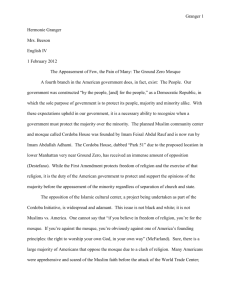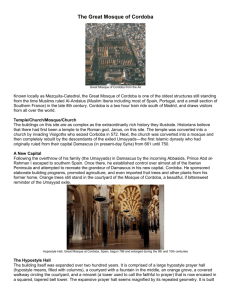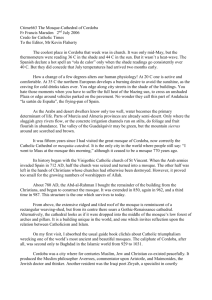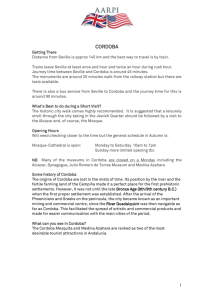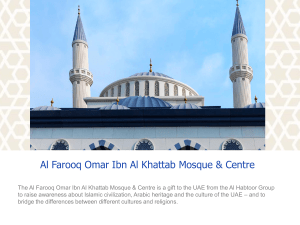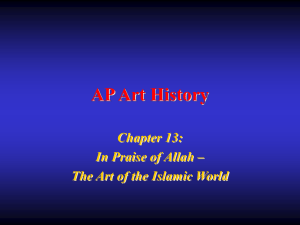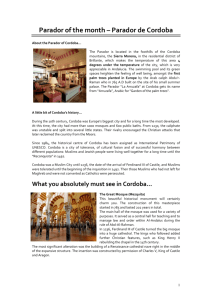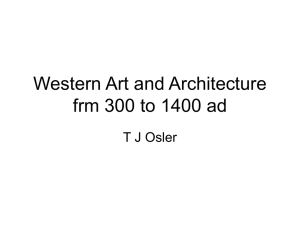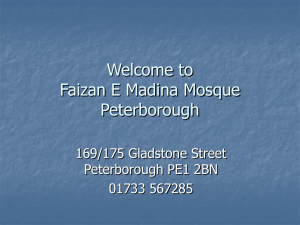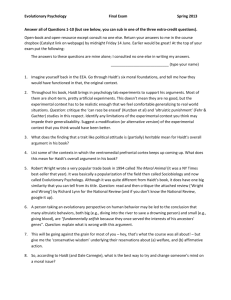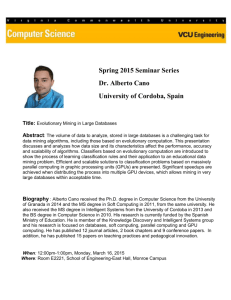Disgust and the Ground Zero Mosque
advertisement
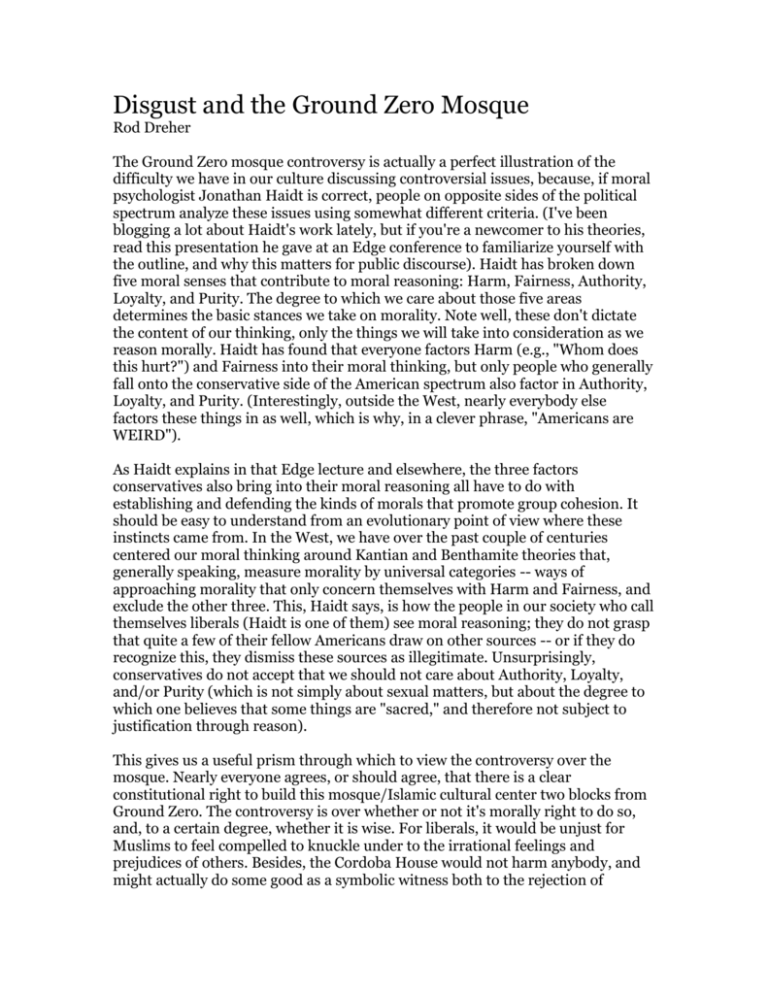
Disgust and the Ground Zero Mosque Rod Dreher The Ground Zero mosque controversy is actually a perfect illustration of the difficulty we have in our culture discussing controversial issues, because, if moral psychologist Jonathan Haidt is correct, people on opposite sides of the political spectrum analyze these issues using somewhat different criteria. (I've been blogging a lot about Haidt's work lately, but if you're a newcomer to his theories, read this presentation he gave at an Edge conference to familiarize yourself with the outline, and why this matters for public discourse). Haidt has broken down five moral senses that contribute to moral reasoning: Harm, Fairness, Authority, Loyalty, and Purity. The degree to which we care about those five areas determines the basic stances we take on morality. Note well, these don't dictate the content of our thinking, only the things we will take into consideration as we reason morally. Haidt has found that everyone factors Harm (e.g., "Whom does this hurt?") and Fairness into their moral thinking, but only people who generally fall onto the conservative side of the American spectrum also factor in Authority, Loyalty, and Purity. (Interestingly, outside the West, nearly everybody else factors these things in as well, which is why, in a clever phrase, "Americans are WEIRD"). As Haidt explains in that Edge lecture and elsewhere, the three factors conservatives also bring into their moral reasoning all have to do with establishing and defending the kinds of morals that promote group cohesion. It should be easy to understand from an evolutionary point of view where these instincts came from. In the West, we have over the past couple of centuries centered our moral thinking around Kantian and Benthamite theories that, generally speaking, measure morality by universal categories -- ways of approaching morality that only concern themselves with Harm and Fairness, and exclude the other three. This, Haidt says, is how the people in our society who call themselves liberals (Haidt is one of them) see moral reasoning; they do not grasp that quite a few of their fellow Americans draw on other sources -- or if they do recognize this, they dismiss these sources as illegitimate. Unsurprisingly, conservatives do not accept that we should not care about Authority, Loyalty, and/or Purity (which is not simply about sexual matters, but about the degree to which one believes that some things are "sacred," and therefore not subject to justification through reason). This gives us a useful prism through which to view the controversy over the mosque. Nearly everyone agrees, or should agree, that there is a clear constitutional right to build this mosque/Islamic cultural center two blocks from Ground Zero. The controversy is over whether or not it's morally right to do so, and, to a certain degree, whether it is wise. For liberals, it would be unjust for Muslims to feel compelled to knuckle under to the irrational feelings and prejudices of others. Besides, the Cordoba House would not harm anybody, and might actually do some good as a symbolic witness both to the rejection of Islamic extremism by the Muslims associated with it, and to the tolerance of America, welcoming a prominent Muslim institution only two blocks from Ground Zero. To conservatives -- and I'm generalizing here -- the mosque is a bad idea. There are very good questions conservatives have about who's paying for this mosque, and whether or not the Muslims behind it are totally on the up and up (given how unwise it is to take at face value pleasant and conciliatory words spoken by American Muslim leaders). These are questions that could be settled, in theory, through reasoned deliberation. What cannot be is the whole question of Purity/Sacredness -- and that's what I believe accounts for the vehemence of this issue on the Right. It strikes many conservatives as innately wrong to have an Islamic center built so close to the site where one the most infamous attacks in American history was carried out by pious Muslims in the name of Islam. Worse (to them), this building is going up as a direct response to that act. As one writer put it in a powerful essay against the Cordoba House project: The claim that the events of September 11, 2001, had “nothing to do with Islam” is an abject and destabilizing lie. This murder of 3,000 innocents was viewed as a victory for the One True Faith by millions of Muslims throughout the world (even, idiotically, by those who think it was perpetrated by the Mossad). And the erection of a mosque upon the ashes of this atrocity will also be viewed by many millions of Muslims as a victory—and as a sign that the liberal values of the West are synonymous with decadence and cowardice. I should point out that the author of that essay, the secular atheist Sam Harris, is in fact not a conservative at all, and indicates in the piece that he's appalled to find himself on the same side as prominent Republicans. You really should read the Harris piece; he discusses in detail why it's not at all clear that the fanatics who brought down the Twin Towers were outliers on Islamic tradition, and how in his view we are discouraged from discussing the particularlity of Islamic religious ideas out of a misplaced sense of courtesy. The point of the paragraph I've highlighted here is to say that for the (liberal atheist) Harris, as for many conservatives, Ground Zero is a sacred spot. The idea of an Islamic cultural center linked to the patch of ground where thousands were murdered in the name of Islam is offensive on its face, because it profanes the sacred. It is completely beside the point for Cordoba defenders to point out that nobody would complain about a Jewish or Christian center built near Ground Zero, or that there were plenty of mosques near the World Trade Center before September 11, 2001. Cordoba House is explicitly founded as a response to 9/11, and is being sited close to Ground Zero because of what happened there. That mosque defenders don't understand why this upsets many people beyond their ability to articulate shows an incredible tone-deafness to how the world actually works. I get this, actually. It's how I first felt when the Carmelite convent at Auschwitz controversy arose in the 1980s. I didn't understand what the objection was. Why should Jews object to nuns praying for the dead there? Christians were murdered at Auschwitz too. True (I thought), Jews have a point when they say centuries Christian anti-Semitism paved the way for the Auschwitz, but can they not see that this convent is a place of healing, of uniting a Church and religious tradition that was so often the cause of Jewish suffering to the utmost concrete symbol of Jewish suffering? All these were reasonable objections. But what I finally realized was they don't matter. The injury suffered by Israel at Auschwitz was so grievous that it really is not my place, as a Christian, to tell Jews it is irrational for them to be offended by the convent at Auschwitz. I tried to imagine what the situation looked like from the point of view of Jew. When I did that, my rational arguments melted away, in the sense that they lost their force. They weren't defeated by rationality, but they were defeated by a sense of compassion for the Jewish people, and a conviction that however irrational their strong objection to the Carmelite convent seemed to me, the whole purpose of the convent -- to work at redeeming the Shoah through prayer -- was largely obviated by the rejection of the project by Jews who believed it profaned a place they hold as sacred in their memory. This is pretty much what's going on with Cordoba House. No matter how wellmeaning its founders, and how rational their case may be, it will almost certainly not do what they say they want it to do, because precisely the Americans they wish to witness to with a message of peace are incapable of receiving and affirming that message because they see Cordoba House at Ground Zero as a profanation of something sacred. The fact that critics aren't bothered by the idea of Cordoba House existing some distance away from Ground Zero tells you a lot about the Sacred/Profane nature of the opposition. When you have to tell people who see something as sacred that they really have no rational grounds for doing so, you have lost the argument for hearts and minds, even though you may win the argument in court, or in a formal debate. True, you cannot operate by always yielding to the sensitivities of a particular group. This is why political correctness is so harmful; it empowers a privileged elite to silence its opponents, and to prevent the kind of open deliberation important to the success of free societies. But there is a difference between political correctness and prudent sensitivity. The last time the Confederate flag controversy came up, I understood that for many white Southerners, the Stars and Bars is not a symbol of racism and oppression, but a symbolic expression of regional cultural pride. But it cannot be denied that for the black minority in the South, it is a symbol of slavery and oppression. Prudence, as well as a decent regard for the suffering blacks endured under that flag, dictated its shunning. This was denounced by some as political correctness, but we err if we think that just because we believe our intentions are good, and we have the right to do something, that we ought to do it. But I'm getting afield here. In conclusion, I want to join Conor Friedersdorf, whose view on Cordoba House is opposite of mine, in lamenting that this issue is rapidly emerging as a defining one in American politics during this election year. We have so many enormous and enormously complex problems facing us that it's pretty close to calamitous, in my view, that we may fight this fall's election over Cordoba House. To liberals, this just goes to show how stupid the American people are, and how unprincipled and demagogic Republican politicians are to be exploiting this issue. To this, I would counsel stepping back from the reflexive rights-based liberalism platform, and trying to view this controversy through a Haidtian prism. There's a reason why the Ground Zero mosque has drawn such passion outside of rarefied elite circles -- and it is far more complicated than so-called "Islamophobia." Cordoba House is a powerful symbol of Who We Are. It defines us as a people. For some, it's important that Cordoba House exist at Ground Zero because it will stand for America as a cosmopolitan, tolerant nation. For others, it's important that Cordoba House not exist at Ground Zero because if it does, it will symbolize a nation that is so eager to affirm tolerance and multiculturalism that we profane the memory of Islam's victims, and break faith with the dead. Cordoba House's power as a cultural symbol, and a symbol of what the American tribe stands for, could hardly be more stark. That many political and cultural elites (academics, journalists, etc.) fail to appreciate its power in this regard -- and to appreciate something is not the same thing as agreeing with it -- is a dramatic failure of imagination. It is highly significant that even in New York City, the only borough that supports the mosque is Manhattan (and then by a bare majority). Do the Americans who live in a Manhattan of the Mind ever stop to consider why so many of their fellow citizens find the idea of situating a mosque near the site of a spectacular Islamic massacre of Americans to be profane? Or do they simply see these Americans as flat-out bigots, end of story? What does it foretell about the future of this diverse and fractious nation when such a deep and powerful divide exists between the people and the powerful? True, there is always such a divide, over any number of issues; but when the Sacred/Profane dynamic gives it such emotional power, as it does in the Cordoba House case, we are trespassing on a mystery, which by definition defies rational calculus. I am reminded of these words from sociologist James Davison Hunter's seminal work from the early 1990s, "Culture Wars: The Struggle to Define America." He writes: The second problem is that when progressivists have had the courage to break out of that bind to talk about "our obligations toward one another" or the "boundaries of community life," they often do so in languages that do not resonate with anyone but those who breathe the rarified air of the university campus. The great debates between liberals and communitarians over the nature of justice, of rights and equality, of the good, and so on, for example, are almost always pitched in an economic or philosophical language that is virtually impenetrable for even the broadly read nonexpert. So too the idea proposed by another school of progressivists thought, that our sense of moral obligation in modern secular society derives principally from the concrete circumstances of our everyday lives -- that community is possible because of the moral meanings we socially create and recreate in the tedium of daily living -- is yet another example of how inaccessible the intellectual languages of moral obligation are. These two cases illustrate something else too; that is, the strong tendency within a good part of progressivist thinking to ignore religion. The basic anthropological reality is that most human societies have been religious -- transcendent faith, in other words, have been the source of the moral obligation that underlies collective life. Yet like the word "morality," the concept of religion or transcendence is also very often dismissed by secular progressivists as "rightwing." Here too they are way off the mark. The point is that the failure to articulate the constitutive elements of public order -- of limits and so on -- and the tendency to reject the possibility of transcendence as a source of communal renewal are two fundamental aspects of a progressivist public philosophy that will alienate not only their opposition but the mainstream of American society. The word "religion" is critical there. Not only are progressivists, re: the mosque, refusing to take as seriously as they ought religion as a system of ideas that actually dictate how people live in this world (something that a stern atheist like Sam Harris actually does, to his credit), but they're also dismissing, or devaluing, a sense of the sacred (as distinct from particular religions) as a source of meaning in the everyday lives of people. From the point of view of many conservatives, the Cordoba House controversy is yet again an example of the cultural elite (a word I use in the descriptive sociological sense, not in the partisan sense) displaying a contempt for their values. And, from a liberal/progressivist point of view, conservatives are returning the favor. Anyway, in his book's narrative, Hunter then goes on to criticize flaws in the orthodox/conservative approach to these questions of public morality, and then concludes with a line that discloses the stakes: Among the weakness in both orthodox and progressivist alliances, then, is an implict yet imperious disregard for the goal of a common life. [Emphasis his.] I believe that the Manhattan Of the Mind people are going to win the Cordoba House battle, because they believe rights are more important than the common good, and there is no legal way to stop the construction of the mosque (nor, let me add, should there be). But I believe the victory will be entirely Pyrrhic, in more or less the same way it would be for a husband to defeat his wife on logic in an argument, but to leave her so alienated that he undermines the strength of their family's common life. UPDATE: This morning I've learned some information that, quite frankly, came as a surprise to me. It's from a recent CNN/Opinion Research Poll. Turns out an overwhelming majority of Americans (68 percent) oppose the Ground Zero mosque. You won't be surprised to learn that opposition is strongest in the South (75 percent against), but you might be surprised to learn that opposition is strong in the Northeast (65 percent) and the Midwest (same). Unsurprisingly, nine out of 10 people who call themselves conservatives oppose it, and four out of five Republicans. More interesting, 70 percent of self-described independents (and 61 percent of self-described moderates) oppose it. Even more interesting, 54 percent of Democrats oppose it -- perhaps not altogether surprising, given that there is a such thing as a conservative Democrat. The figure that was especially startling to me was that 45 percent of self-described liberals are against this project. That's nearly half. Of course being in the majority doesn't make you right. Still, people who believe that opposition to Cordoba House is limited to the populist right, or to marginal cranks and bigots, are deceiving themselves. There is something else going on here, and I continue to believe the work of Jonathan Haidt offers important insights into what it is. ….From Big Questions Online
